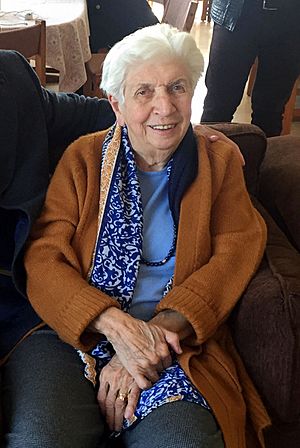Lamia Al-Gailani Werr facts for kids
Quick facts for kids
Lamia Al-Gailani Werr
|
|
|---|---|
| لمياء الكيلاني | |

Al-Gailani, 16 January 2019
|
|
| Born | 8 March 1938 Baghdad, Iraq
|
| Died | 18 January 2019 (aged 80) Amman, Jordan
|
| Education |
|
| Spouse(s) |
|
| Children |
|
| Awards | Gertrude Bell Memorial Gold Medal (2009) |
| Scientific career | |
| Institutions |
|
| Thesis | Studies in the Chronology and Regional Style of Old Babylonian Cylinder Seals (1977) |
| Doctoral advisor | Barbara Parker-Mallowan |
Lamia Al-Gailani Werr (born March 8, 1938 – died January 18, 2019) was a famous Iraqi archaeologist. She was an expert in ancient objects from ancient Mesopotamia, a region in the Middle East.
Lamia Al-Gailani was born in Baghdad, the capital of Iraq. She studied in both Iraq and the United Kingdom. Her special research on ancient cylinder seals from the Old Babylonian period was very important in her field.
She lived in London for many years. She was known for keeping connections between British and Iraqi archaeologists. This was important even when Iraq faced difficult times. She worked hard to protect cultural treasures after the Iraq War.
She played a big part in rebuilding the National Museum of Iraq. She had worked there as a curator (someone who looks after museum collections) in the 1960s. She also helped start the Basrah Museum. In 2009, she received a special award called the Gertrude Bell Memorial Gold Medal.
Contents
Becoming an Archaeologist
Lamia Al-Gailani was born in Baghdad on March 8, 1938. She first studied at the University of Baghdad. Then, she went to the University of Cambridge in the UK to finish her first degree.
In 1961, she started working at the National Museum of Iraq. This museum became a very important part of her life's work. She returned to Britain in the 1970s. There, she earned a master's degree from the University of Edinburgh. After that, she completed her PhD at the UCL Institute of Archaeology in London.
Her Important Research
For her PhD, Lamia Al-Gailani studied cylinder seals from the Old Babylonian period. These are small, carved cylinders used in ancient times to make impressions on clay. Her research focused on the seals kept at the Iraq Museum.
Her PhD paper was published in 1988. Another expert, Dominique Collon, said it was a "succinct and informative discussion." This means it was short, clear, and full of useful information. Collon also said it should be a guide for future studies.
Protecting History in Iraq
After getting her PhD in 1977, Lamia Al-Gailani stayed in London. She worked as a researcher at the UCL Institute of Archaeology and the School of Oriental and African Studies (SOAS). Even though she lived in London, she often went back to Iraq. She worked to keep Iraqi archaeologists connected with the rest of the world. This was especially important during a time when Iraq was isolated.
In 1999, she co-wrote a popular book in Arabic called The First Arabs. This book explored the archaeology of early Arab culture in Mesopotamia.
Rebuilding Museums
From 2003 onwards, Lamia Al-Gailani focused on saving ancient objects in Iraq. She helped rebuild the Iraq Museum after it was damaged and looted during the American-led invasion in 2003. She often spoke about the challenges faced by museums in Iraq after the war.
She advised the Iraqi Ministry of Culture. She was very involved in the reopening of the Iraq Museum in 2015. She also helped establish the Basrah Museum in 2016. At the time of her death in 2019, she was writing a book about the history of the Iraq Museum. She was doing this research at the Metropolitan Museum of Art in New York.
Her Life and Family
Lamia Al-Gailani came from a well-known family in Iraq. Her family tree included important historical figures.
She was married twice. Her first husband, Abd al-Rahman Al-Gailani, was a historian who studied Islamic buildings. Her second husband was George Werr, a businessman from Jordan, who passed away in 2003. Lamia Al-Gailani had three daughters: Noorah Al-Gailani, Azza Al-Gailani, and Hesn Werr. As of 2019, her daughter Noorah Al-Gailani was a curator at the Glasgow Museums in Scotland. She looked after collections related to Islamic civilizations.
Her Legacy
Lamia Al-Gailani passed away in Amman, Jordan, on January 18, 2019. Her funeral procession started from the Iraq Museum. She was buried in the Mausoleum of Abdul-Qadir Gilani in Baghdad, where one of her ancestors was also buried.
She was the only person to be given a lifetime honorary membership by the British Institute for the Study of Iraq. This shows how much they valued her work. In 2009, she also received the Gertrude Bell Memorial Gold Medal from the institute. Her work helped protect and share the rich history of Iraq with the world.
See also
 In Spanish: Lamia Al-Gailani Werr para niños
In Spanish: Lamia Al-Gailani Werr para niños
 | Toni Morrison |
 | Barack Obama |
 | Martin Luther King Jr. |
 | Ralph Bunche |

